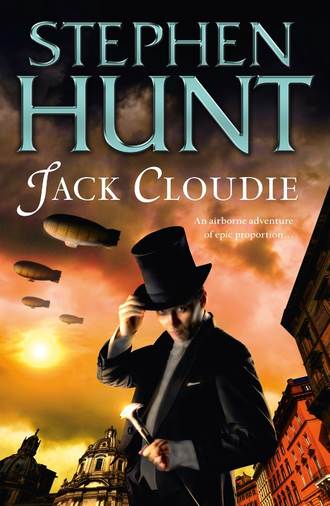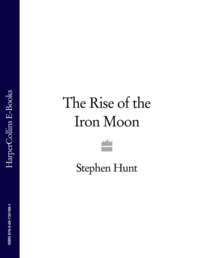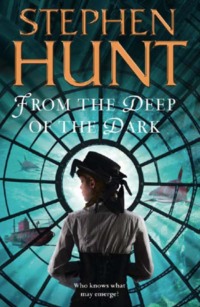
Полная версия
Jack Cloudie
Omar hollered in fear as a head as long as he was tall lashed out of the shadows to lance the tossed carcass on its razor-sharp beak, throwing it up into the air like a cat playing with its prey, before swallowing the carcass in a single sinuous gulp.
‘And human flesh,’ added Uddin, gripping Omar’s shoulders tight. ‘When they are permitted it.’
Jack Keats yelled as the rush of air whipped past his face. A thousand feet above the ground wasn’t high enough to require the Iron Partridge to run pressurized, but it was high enough that no airship sailor would walk away from a fall. Even hanging upside down, Jack could just hear the reasonably voiced protests of the steamman Coss Shaftcrank from an open gun port.
‘I’ve done it,’ cried Jack, the blood rushing to his head. ‘I’ve kissed the ship’s nameplate.’
The lumpen face that belonged to the two hands clutching Jack’s ankles poked out of the gun port where the cannon’s rubber hood had been withdrawn, a brief distraction for Jack from the distant landscape whipping past below at seventy miles an hour.
His answer came back over the roar of the engine cars below. ‘You aren’t low enough to have done it proper, thief boy. Stretch yourself down.’
Jack felt his body jolt as the hands around his ankles swung him down still lower. As initiation ceremonies went, the Royal Aerostatical Navy’s seemed particularly brutal and pointless. At least when he had been running with the flash mob, his baptismal trial of breaking into a warehouse one night had yielded a few pennies of profit.
Pasco, the ship’s savage master engineer and self-appointed ‘tutor’ of the navy’s traditions to the new hands, leant further out of the gun port and threw a line down to Jack. At first, Jack thought that he was meant to grab it – extra security now that his ordeal was over – but then he noticed the bulky pair of gloves hanging at the end.
‘Put them on, thief,’ shouted the master engineer. ‘One at a time.’
It had been Pasco’s turn to teach the classes that the new recruits were obliged to sit – instructions on ship lore and layout, the navy’s rules, regulations, traditions – the thousands of obscure pieces of equipment that an airship sailor’s life depended on. Pasco’s teaching methods, however, seemed rather more direct than those of his fellow officers.
The gloves swung closer and Jack did as he was bid, discovering a handle inside each of the leather mittens just as the fingers holding his ankles released their grip. Jack screamed in panic, sliding head first down the outside of the Iron Partridge until he swung around on the gloves, gravity and the winds tugging his boots as he found himself miraculously clinging onto the side of the massive craft’s iron plates. The gloves are magnetic! When his hands had contracted inside the gloves, the gauntlets had activated – and releasing the handle inside loosened the invisible bond between man and the airship’s hull. Hair blowing in the crosswinds, Jack glanced up at the jeering faces, shouting abuse – or possibly encouragement – from the safety of their gun port.
Down below, the transmission belt running out to the engine car underneath growled at Jack, as if the engine moulded as a lion’s head was actually alive; its rapidly turning rotor waiting to carve him into pieces if he lost his hold. He could hardly hear the engine over the sound of his own heart hammering inside his chest. Crying in an unholy blend of rage and fear, Jack released the magnet’s activator on his left hand and threw his arm up to fix his glove on the metal plating above his head. Repeating the manoeuvre, using the rivets on the plates below him as barely functional footholds, Jack steadily, desperately, clanged his way back up the airship’s outer metal skin and towards the open gun port. There were thieves back in the capital who specialized in running the labyrinthine maze of rooftops and towers in Middlesteel, experts in rattling skylights. Jack was not one of them. Don’t look down. One hand in front of the other and whatever you do, don’t look down.
The young sailor cursed his tormentors with every freezing yard he climbed. Finally, Jack got near enough to the gun deck to hear a commotion inside – which explained where the jeering sailors who had just been observing his progress had disappeared to. Grasping the inside of the gun port, Jack tumbled back onto the airship’s deck and fell into the middle of a brawl.
John Oldcastle was wielding one of the flat-headed rammers the gunners used to load cartridge wad and shot as a stave. Two sailors had been laid out cold with its blunt end, and the large officer had Pasco, the master engineer, pressed down on the neck of a thirty-two pounder. His makeshift weapon was held tight against Pasco’s throat, choking the man. Coss Shaftcrank was also threatening some of the master engineer’s men with a wad hook, his voicebox sounding a warning in case they tried to save their chief.
Coss was still wearing the harness the sailors had used to dangle him out over the hull, none of the cowards wanting to risk the creature of the metal’s weight dragging them over the side during his brutal initiation ceremony.
‘Ah, there you are lad,’ said Oldcastle. ‘Me and the master engineer were just having a lively little debate about the use of a safety line during the kissing of the ship.’
‘What loss is that thief going to be?’ choked Pasco. ‘Fresh out of Bonegate jail. Another pressed man. Better the bastard drops now before one of his mistakes kills a real cloudie.’
‘I can find a blessed use for him on the upper deck,’ said Oldcastle, easing up the pressure on the master engineer’s neck. ‘And if you try to nobble the lad again, I’m going to take the harness off this old steamer and see if it’s long enough to swing you down onto the rotors of one of your own engine cars.’
‘You’re just a warrant sky officer, the same as me,’ said Pasco, angrily rubbing his sore throat. ‘You don’t get to decide who has the new signings. Maybe the thief’ll end up in my engine room, and then he’ll know what it is to serve in the Royal Aerostatical Navy.’
‘The first lieutenant has already given me these two,’ said Oldcastle, indicating Jack and Coss Shaftcrank. ‘And we’ve got our own initiation ceremony up top.’
‘You and the first lieutenant,’ spat Pasco. ‘You’ve got your tongue so far up her arse it’s a wonder you can talk. She’s as much a greenhorn as these two. What’s this to her? First voyage for some lady noble with more connections at Admiralty House than sense? You and me, Oldcastle, we’ll settle this proper when we’re back on shore.’
‘Well you’d better be prepared to wait a good long while, then.’
Jack saw a dangerous look cross Pasco’s face as the engineer realized that the old sailor knew how long they were going to be in the air. ‘You know where we’re going, fat man? You know what the captain’s orders are?’
‘I know your rotors are going to need to keep on turning to get us there, Master Engineer Pasco. And that’s as much as you need to understand to do your mortal job.’
Jack followed Oldcastle and the steamman as they warily withdrew from the gun deck and headed for the upper lifting chamber – one of two on the airship – its vast space filled with thousands of spherical gas bags secured by netting. The ironically named crew of idlers were busily checking pressure and looking for rodent-teeth tears and leaks that needed patching. Metal ladders fixed inside pipework frames connected the Iron Partridge’s upper deck and lifting chamber, but Jack was relieved when John Oldcastle led them to the frame that held the lifting belt – a privilege, he had been warned, usually reserved for officers. After the ordeal of kissing the ship, Jack didn’t think he could stand to climb by hand up one of the lifting chamber’s vertigo-inducing ladders.
Waiting for one of the wooden steps fixed onto the rotating leather belt to come around, Oldcastle appraisingly looked over Jack and the steamman. ‘Master Engineer Pasco knows his engines well enough, lads, but he’s a rabble-rouser who’s spent time in a stockade for trying to organize the RAN’s engineers into a workers’ union.’
‘And we’re the only ship that would have him,’ said Jack, remembering the first lieutenant’s confrontation with the vice-admiral the evening before the airship launched.
‘All we could mortal get,’ said Oldcastle, grabbing a hand-hold on the belt as he swung his boots out onto its wooden step. Jack followed after Coss Shaftcrank stepped on, watching the floor of the lifting chamber drop away as he was carried nearly eighty feet up towards the highest of their airship’s seven levels, the upper deck.
‘Like our ship herself, perhaps?’ said Coss. ‘Due to be scrapped, but rescued at the last minute …’
‘A flying albatross right enough,’ said John Oldcastle. ‘And when we get to my kingdom under the crow’s nest, you’ll see quick enough why.’
‘I understand the Iron Partridge was a proving craft,’ said the steamman. ‘Built in the air yards of the House of Quest.’
Oldcastle stepped off the belt as they passed through to the upper deck, ignoring the smells and sounds coming from an open door down the corridor where the airship’s stock of pigs and sheep were housed. ‘Aye, I can see you’ve done your research before signing on with us, Mister Shaftcrank. But all she proved was that the great industrial lord that built her wasn’t quite as clever as he believed he was.’
Jack saw why once the warrant sky officer had led them through a series of narrow corridors past several doors labelled as stores. Nestled between the wooden walls, a short companionway led up to the last thing Jack had expected to see on board an airship – transaction engines! They looked down into a long deep pit filled with the massive calculating machines, and not in any design that Jack was familiar with. Multiple banks of transaction-engine drums slowly turned as steam hissed out of a labyrinth of copper pipes. At the far end of the transaction-engine room was a series of globe-shaped boilers. Two stokers were feeding the furnace, the sweat-soaked skin of their bare chests glowing orange against the flames.
‘Sweet Circle,’ swore Jack, stretching over the railing to look down at unfamiliar symbols turning on the thinking machines’ drums. This is nothing like the antiquated standard equipment I trained on back in the guild. ‘I’ve never seen the like – what’s it doing here?’
‘A folly, Mister Keats,’ said Oldcastle. ‘A folly that has never worked. And the other reason, besides our blessed armour plating, why the Iron Partridge handles like a whale of the air, large and slow-like.’
‘The softbody designers intended for these thinking machines to control the airship,’ said Coss. ‘Using a crew a tenth of the size of a normal ship of the line.’
‘Not just the airship, old steamer,’ said Oldcastle, pointing up to a rubber-sealed skylight in the ceiling from where the frill of massive mortar tubes was visible outside, stretching like a spine of chimneys across the top of the ship. ‘But all the gunnery on this wicked organ of death we’re lugging about on our backs, too.’
‘And it never worked?’ asked Jack.
‘Over-engineered,’ said Oldcastle. ‘Much like the mind of the fool who designed it – too clever for his own mortal good. When the navy realized the vessel’s automation couldn’t cope, they spent a second fortune redesigning the Iron Partridge to work manually with a full crew – and the airship still didn’t fly well enough. Our main job here is to make sure that the transaction engines don’t get in the way of the crew. The systems still try and come back fully online every now and then, working their automated mischief. These transaction engines were buried too wicked deep into the fabric of the ship for us to allow the boilers to run cold and still their drums altogether. Just enough power to let her tick over and no more, that’s what we must be about.’ He pointed to a line of hammocks hung up behind the spherical boilers, the sailors’ wooden air chests sitting beneath. ‘You can bed down there. You’ll be glad of the boilers when we’re running high and cold. Warmest place on the Iron Partridge, so it is. The watch in the crow’s-nest dome down the corridor come in here after they’ve stood a duty, to toast their gloves against our plates.’
Better than the cramped confines of the crew’s quarters on the lower deck where Jack had been camped until now, he supposed. Blanket Bay, as the airship’s sailors referred to the long swathe of hammocks.
‘Is it only us up here?’ asked Jack.
Oldcastle nodded sadly, gesturing to the rows of empty punch-card writers and injection desks opposite the boilers. ‘There’s not many trained enginemen and cardsharps with a taste for the navy’s foul food and parliament’s meagre pay. Even our two stokers are on loan from the captain of marines.’
Jack nodded. So, was this pit of broken thinking machines the reason the RAN had been so eager to rescue him from the gallows? But then there had been the man in court. Jack knew his face from somewhere. But where?
‘We might have been the pride of the fleet,’ said Oldcastle with a melancholy expression pinching his cheeks. ‘Gliding over the battlefield like an eagle and letting enemy cannon fire bounce off our hull while our mortar shells found the foe’s helmets as if the very steel in our guns were bewitched. But here we are instead, on another desperate voyage, with cruel fate carrying us far from home. Damn my unlucky stars.’ He looked at the curious faces of Jack and Coss. ‘But I mustn’t say too much about that. The first lieutenant’s orders are the first lieutenant’s to keep.’
‘You mean the captain’s orders?’ said Jack.
‘Indeed, Mister Keats. Too much heat in here. It dries a man’s mind without a little wine to help moisten the thinking.’
‘It is clear we are travelling south, warrant sky officer,’ said Coss Shaftcrank. ‘Every sailor on this ship can read that from the sun and the stars.’
‘Master cardsharp, if you please, old steamer,’ said Oldcastle. ‘A title you would normally hear when saluting the supply clerks of Admiralty House, I admit, but it is mine for this voyage.’
‘And the newssheets have been full of talk of war, master cardsharp,’ said Jack. ‘With Cassarabia to the south. Now that they can build ships like ours.’
‘Oh, they have always been capable of building ships like these, lad,’ said Oldcastle. ‘Floating them with a gas that doesn’t explode like a grenade when you strike a spark in the lifting chamber has been a trick that’s proved a little harder for the empire to master, but one they seem to have got hold of now.’
‘Will it be war, sir?’ asked Jack.
‘Always, lad. There’s two cocks-of-the-lane swaggering down the street, and only enough space on the cobbles for one of them. And the caliph has to build a great new temple every century or so, with Cassarabian tradition demanding it be paid for by tribute taken from heathens and new conquests, not by his own people. Booty for his army and supporters, to keep them all on-side and well greased. Yes, there’ll be war alright, now that the Cassarabians have airships to take on the Royal Aerostatical Navy. The only question is when. And whatever the answer to that, you’d better hope that we’re not on board the ship when it breaks out. Not that you’ll hear such a view coming from Admiralty House. They think that because the RAN’s been sailing in the clouds for centuries, our tactics and experience will see the Cassarabians off like cheap whipped hounds if they dare to drift across our border with mischief in mind.’
‘You don’t think we will?’
‘I’ve never been privy to an easy victory, Mister Keats,’ said the old officer. ‘No, indeed, I don’t think I know what one of those even looks like.’
Now Jack could see why the crew seemed so restless on board the airship, pressed men and the scrapings of the barrel, sailing on an unpopular scrapyard vessel towards trouble. Whatever their mission was, it was obvious that Admiralty House hadn’t wanted any part of it. And that meant politics. Army interference, or parliamentarians in the House of Guardians ramming it down the reluctant throats of the braided naval uniforms who thought they knew best.
The three of them were meant to ensure that the chamber of thinking machines didn’t interfere with the running of the ship. But who is going to ensure that I return alive to keep Alan and Saul safe?
Omar yelled as the great winged lizard, the drak that Farris Uddin had named as Quarn, banked and began to descend towards Bladetenbul. Never in all his years as a slave had Omar expected he would see Cassarabia’s capital city – and if someone had told him a week ago that his introduction to its immense spill of streets, souks and towers would be from a saddle at a hundred feet, he would have joked that the speaker had been exposed to the heat of the sun for too long.
The light of Bladetenbul is the light of the world, ran the old saying, and from this high up Omar could see why. There was a great fortified wall running around the outside of the seven hills the city sprawled across, and behind the fortifications stood the capital’s sun towers, each fluted construction filled with boilers and capturing the reflected light of the thousands of great mirror arrays that circled Bladetenbul. Water into steam, steam to drive the city’s machines, and the steam caught again and fed back into the system of reservoirs and pipes – far too precious a resource to waste on the sky under god, as the heathen northern nations were said to.
Light from the mirrors seemed to reflect off the drak’s green-scaled skin, dazzling Omar where he sat behind Farris Uddin, strapped above the base of the creature’s long sinuous neck. The rushing of the wind and the drumming of the drak’s wings made it hard to communicate with Farris Uddin – not that the taciturn killer had much to say to Omar. He really was an imperial guardsman, that much was certain. Sand dogs and bounty hunters did not ride such creatures as this, that Omar knew. As much effort as the womb mages of Omar’s old house had put into the breeding and nurture of salt-fish, it was child’s play compared to the skill and resources needed to create and raise something as large and complex as a drak.
They whisked lower over the city, low enough for Omar to see the bazaars crowded with canopy-covered stalls selling silks and spiced rice, iced-water sellers weighed down with gas-cooled tanks on their backs, importuning the clients coming out of the great domed bathhouses. The drak followed the line of the stone pipe network that fed the capital with its precious water supplies, flying so near to the ground that Omar winced as they banked around minarets, the breeze from their passage ruffling the robes of the watermen at the major tap-points, officials inspecting the lines of those waiting for any sign of unpaid water taxes.
On the drak hurtled, riding the thermals from the whitewashed city below and hardly beating a wing now, gliding up towards the tallest of the hills where the Jahan Palace waited. Not for nothing was this called the Jahan – simply, the world. A tower-tall crystal dome on the brow of the hill, ruby coloured and surrounded by smaller emerald green domes. World enough for the Caliph Eternal and his court. Sultans and emirs came here to renew their vows and the pledges of their nations to the mighty emperor of emperors, Akil Jaber Issman, blood descendent of the legendary Ben Issman himself, his name be blessed. What chance would the barely freed slave of an outlawed heretic house have when swimming in such perilous currents?
Farris Uddin’s massive drak glided towards a series of fortifications sitting watchfully behind the massive central dome of the palace. Embedded on top of a rocky rise, it was the eyrie of the guardsmen that protected the caliph and his realm. Tilting back, the drak used its wings to break, two massive clawed feet touching down on the rock floor of a cave-like opening, then swinging forward to walk them into a hangar where jagged walls were hung with rows of colourful shields. A stableman emerged from a door in the wall and ran a cable through the drak’s harness, before receiving Farris Uddin’s instructions on the creature’s care. As the young stable hand led the drak away, Farris turned to Omar. ‘That is Boulous, my retainer. He is a slave, and though his blood is originally of Jackelian stock, his heart has been raised to be as stout as any guardsman that serves the order. I chose him for his keen mind. Let his caution, wisdom and loyalty become yours.’
‘I shall be at least twice as loyal as he; you have my word under the sight of god and Ben Issman, his name be blessed. Are they in the palace below, master? The priests of the new sect that had my house declared heretic?’ asked Omar.
‘Indeed they are,’ said Farris Uddin, splashing cooling water on his shaved head from a wall-mounted basin.
‘Do not sell me to them, master. I shall work harder for you than a dozen—’
Farris Uddin raised his hand for Omar to stop and pulled out the young slave boy’s roll of indenture papers. He pointed to the sigils sitting in the bottom corner. ‘Can you read that?’
‘It is the code stamp of a transaction engine, master.’
‘I know what it is. I asked can you read it?’
Omar traced his fingers across the embossed code of vertical bar shapes. ‘It is the date I became a freeman.’ Omar ran his fingers across the code again, confused. ‘But—’
‘Always read the small print, Omar Barir,’ instructed the guardsman. ‘Your papers as a freeman were drawn up by your father two months ago. Long enough for you to have travelled over the desert with a water caravan and made your way to civilized company on your own. Before, mark you,’ he raised a warning finger, ‘before the House of Barir was declared heretic.’
‘I do not understand, master?’
‘A slave cannot serve as the cadet of an imperial guardsman,’ said Farris Uddin. ‘But a freeman can. And in the service of the Caliph Eternal you become Centless. Those in military or civil service are not permitted to follow any one sect. Your oath is directly to the lawful descendents of Ben Issman, unifier of the one true god, and the empire, his name be blessed. No other loyalties are permitted. Not nation, not tribe nor house or sect.’
‘But why am I to be your cadet?’ Omar blurted out. Why did you venture all the way out to the western coast to spare me from a heretic’s fate?
‘Because my last one fell off a drak,’ said Farris Uddin. ‘And because it will annoy the keepers of the new sect endlessly to see the last blood of the House of Barir walking the palace wearing guardsman’s robes. And for many other reasons too, but they are not yours to know.’
‘What call did my father have on you?’ said Omar. ‘He sent for you, did he not? That is why you came to Haffa.’
‘Call enough,’ growled the guardsman. ‘Now hold your tongue and save your questions, boy. A cadet calls his guardsman master as well as a slave does.’
‘Yes, master.’
‘Down there,’ Farris Uddin pointed out of the hangar towards the palace, ‘under those great domes rules the most powerful man in the world. Sultans from Zahyan, Seyadi, Fahamutla and a dozen other kingdoms come to beg favours, offer tribute and remind the Caliph Eternal what good, loyal clients their countries make for the empire. The high keepers of the hundred sects of the Holy Cent jostle each other aside to shower the emperor of emperors with his share of temple tithes. Womb mages vie for favour and peddle promises of miracle cures and prodigiously lethal new creatures. Viziers plot their way to higher council, while generals and admirals struggle to obtain new commissions and appointments. Courtiers and courtesans are as the grass you will walk on, the sighs of their greed, envies, hopes and ambitions are the breeze you will feel on your cheeks. Down there is opulence without equal in the world, but it is not a safe place. You will quickly come to yearn for a world of simple fishermen and uncomplicated water farming.’
Omar nodded. The waves from that world down below had already lapped out and destroyed his own familiar existence, setting him adrift. There was an irony that of all the places in the empire, the tides of fate should have carried Omar here.







